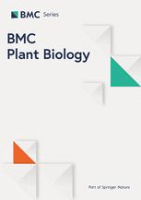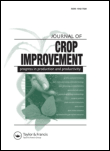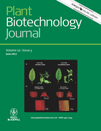
JOURNAL OF PLANT BIOCHEMISTRY AND BIOTECHNOLOGY
Scope & Guideline
Bridging Research and Application in Crop Science
Introduction
Aims and Scopes
- Plant Genetics and Genomics:
Research in this area includes genome sequencing, gene editing (e.g., CRISPR technology), and identification of genetic markers related to stress resistance and agronomic traits in various crops. - Metabolomics and Phytochemistry:
Studies involving the analysis of plant metabolites, including secondary metabolites and their roles in plant defense, nutrition, and medicinal applications. - Plant Responses to Environmental Stress:
Exploration of physiological and biochemical responses of plants to abiotic stresses such as drought, salinity, and temperature extremes, along with the underlying molecular mechanisms. - Biotechnology and Genetic Engineering:
Application of biotechnological tools for crop improvement, including genetic transformation, marker-assisted selection, and the development of transgenic plants for enhanced traits. - Plant-Microbe Interactions:
Investigation of the interactions between plants and microorganisms, including beneficial endophytes and pathogens, and their implications for plant health and productivity. - Sustainable Agriculture and Crop Management:
Research aimed at developing sustainable agricultural practices through biotechnological innovations, including biofertilizers, biopesticides, and integrated pest management strategies.
Trending and Emerging
- CRISPR and Genome Editing:
There is a notable increase in studies utilizing CRISPR technology for precise genome editing in crops, highlighting its potential for enhancing traits such as stress resistance and nutritional quality. - Plant-Based Nanotechnology:
Emerging research focuses on the synthesis and application of nanoparticles derived from plant extracts, showcasing their potential in agriculture for pest management and enhancing crop resilience. - Microbiome and Plant Health:
Research on the role of plant-associated microbiomes in promoting health and stress tolerance is gaining momentum, reflecting a shift towards understanding holistic plant systems. - Metabolomics for Crop Improvement:
The use of metabolomics to identify and enhance beneficial metabolites in crops is becoming increasingly important, particularly in the context of nutritional enhancement and stress resilience. - Bioinformatics in Plant Research:
The integration of bioinformatics tools for analyzing plant genomic and transcriptomic data is on the rise, facilitating a deeper understanding of complex traits and their genetic basis. - Sustainable Practices in Agriculture:
Research emphasizing sustainable agricultural practices, including the use of biopesticides and environmentally friendly cultivation techniques, is increasingly prominent in response to global environmental challenges.
Declining or Waning
- Traditional Plant Breeding Techniques:
There has been a noticeable decline in studies focusing on conventional breeding methods, as the field shifts towards modern techniques such as genetic engineering and CRISPR technology. - Basic Plant Physiology:
Research that solely focuses on fundamental physiological processes without a biotechnological or applied context seems to be receiving less attention in favor of more applied biochemistry and genetic studies. - Chemical Pest Control Methods:
Research centered around chemical methods for pest control is waning as there is a growing emphasis on sustainable and biological alternatives in pest management. - Taxonomic Studies:
Traditional taxonomic research, which primarily focuses on the classification and description of plant species, appears to be declining as more emphasis is placed on understanding molecular mechanisms and applications in biotechnology.
Similar Journals

BMC PLANT BIOLOGY
Innovating Research for a Greener TomorrowBMC Plant Biology, published by BMC, is a leading open-access journal devoted to the field of plant science, presenting high-quality research that contributes significantly to the understanding of plant biology. Since its inception in 2001, the journal has established itself as a prominent platform for disseminating innovative research, achieving a commendable Q1 ranking in Plant Science within the 2023 Scopus quartiles, and ranking #39 out of 516 journals in the Agricultural and Biological Sciences category, indicating its substantial impact with a 92nd percentile ranking. Researchers, professionals, and students engaged in the study of plant biology will find a wealth of knowledge in its comprehensive scope, covering critical areas such as molecular biology, genetics, ecology, and biotechnology. The journal's commitment to open access ensures that cutting-edge research is available to a global audience, fostering collaboration and advancement in the field. BMC Plant Biology continues to inspire and facilitate growth in plant-related studies, making it an invaluable resource for anyone interested in the vibrant and essential domain of plant science.

MOLECULAR BREEDING
Driving Breakthroughs in Agronomy and Molecular BreedingMOLECULAR BREEDING is a prestigious journal published by Springer, dedicated to advancing the field of agronomy, plant science, and biotechnology through innovative research contributions. With an impressive ISSN of 1380-3743 and E-ISSN 1572-9788, this journal has continuously served the scientific community since its inception in 1995. Operating from the Netherlands, MOLECULAR BREEDING is recognized for its high impact factor and status in the Q1 quartile for both Agronomy and Crop Science and Plant Science in the latest 2023 metrics, highlighting its influential role in these domains. With strong Scopus rankings reflecting its position within the top percentiles of various related fields—including a notable 81st percentile in Plant Science—this journal is essential for researchers, professionals, and students striving to understand and innovate in molecular genetics and breeding techniques. Although it does not provide open access, its rigorous peer-review process ensures that published articles maintain the highest standards and contribute significantly to the scientific discourse. The journal’s diverse scope encompasses significant advancements in molecular biology and genetics, ultimately supporting the global objectives of sustainable agriculture and enhanced crop resilience.

Plant Biotechnology Reports
Unveiling Breakthroughs in Plant SciencePlant Biotechnology Reports is a premier academic journal published by SPRINGER, focusing on cutting-edge research in the dynamic fields of biotechnology and plant sciences. With an ISSN of 1863-5466 and an E-ISSN of 1863-5474, this journal serves as a vital platform for disseminating high-quality studies from 2008 to 2024. Situated in Japan, it has earned commendable status within the academic community, ranking in the Q2 quartile for Plant Science and Q3 for Biotechnology in 2023, placing it among the top-tier publications in its domain. Notably, it ranks #160/516 in the Scopus category for Agricultural and Biological Sciences - Plant Science, reflecting its impact and reach in the relevant fields. While it does not currently offer open access, the journal remains an essential resource for researchers, professionals, and students eager to explore breakthroughs in plant biotechnology. Researchers contribute significant advancements that not only drive scientific understanding but also foster innovation in agricultural practices, making this journal pivotal for both academic and practical applications in the realm of biotechnology.

Frontiers in Plant Science
Fostering breakthroughs in plant physiology and ecology.Frontiers in Plant Science is a premier open-access journal dedicated to advancing the understanding of plant biology, covering a broad spectrum of topics including physiology, ecology, and biotechnology. Published by FRONTIERS MEDIA SA in Switzerland, this journal has established itself as a key resource in the field of plant science, boasting an impressive impact factor and ranking in the Q1 category for plant science as of 2023. With its Scopus rank of 61 out of 516 in both Agricultural and Biological Sciences, the journal is recognized for its quality and relevance, being in the 88th percentile among its peers. Since its inception in 2010, Frontiers in Plant Science has embraced an open-access format, ensuring that cutting-edge research is readily available to scientists, professionals, and educators around the globe. The journal aims to foster innovative research and collaboration within the plant science community, making it an essential publication for those looking to stay at the forefront of the discipline.

Horticultural Plant Journal
Pioneering Research for Modern HorticultureThe Horticultural Plant Journal, published by KEAI PUBLISHING LTD, stands at the forefront of horticultural research and innovation. With an ISSN of 2095-9885 and an E-ISSN of 2468-0141, this open access journal has been committed to disseminating significant findings in horticulture since 2015. As of 2023, it proudly holds prestigious Q1 rankings across multiple categories, including Biochemistry, Genetics and Molecular Biology, Ecology, and Plant Science, reflecting its impactful contributions to diverse scientific fields. Located in Beijing, China, the journal not only facilitates groundbreaking studies but also provides crucial insights into sustainability and environmental issues, being ranked in the top tiers of relevant disciplines. This makes it an invaluable resource for researchers, professionals, and students who aim to stay at the cutting edge of horticultural science, offering them the latest research that informs both academic understanding and practical application.

Horticulture Environment and Biotechnology
Elevating Plant Science for a Sustainable FutureHorticulture Environment and Biotechnology is a prestigious journal published by the Korean Society of Horticultural Science, dedicated to advancing knowledge in the fields of horticulture, biotechnology, and plant science. Since its inception in 2011, this journal has played a crucial role in disseminating high-quality research, evidenced by its 2023 category quartile rankings, which position it in Q1 for Horticulture and Q2 for Biotechnology and Plant Science. With impressive Scopus rankings, including Rank #18 out of 115 in Horticulture, the journal continues to demonstrate its significance within the academic community by contributing to innovative practices and findings that impact both environmental sustainability and horticultural advancements. Currently, the journal is accessible to a global audience, facilitating the exchange of ideas and research outcomes with no open-access fees. Horticulture Environment and Biotechnology strives to support researchers, professionals, and students alike by providing a platform for critical discussions on the intersection of horticultural science and biotechnology, thereby fostering the development of sustainable agricultural practices that align with contemporary challenges.

Vavilovskii Zhurnal Genetiki i Selektsii
Bridging Research and Application in GeneticsVavilovskii Zhurnal Genetiki i Selektsii, with ISSN 2500-0462 and E-ISSN 2500-3259, is a distinguished open-access journal published by the Russian Academy of Sciences, Institute of Cytology and Genetics. Since transitioning to open access in 2013, the journal has been dedicated to advancing research and discourse in the fields of genetics and selection, particularly within agricultural and biological sciences. With a current ranking of Q2 in Agricultural and Biological Sciences and Q3 in Biochemistry, Genetics and Molecular Biology according to Scopus, it serves as a pivotal platform for researchers, professionals, and students to disseminate their findings and collaborate on innovative ideas. The journal, housed in the vibrant academic environment of Novosibirsk, Russia, publishes a diverse range of articles that contribute to the ongoing evolution of genetic studies and practical applications in agriculture. Its commitment to quality and accessibility ensures it plays an essential role in the global scientific community, fostering knowledge that bridges theoretical research and practical implementation.

Journal of Crop Improvement
Fostering sustainable practices in agronomy and crop science.The Journal of Crop Improvement, published by Taylor & Francis Inc, is an esteemed platform dedicated to advancing the field of agronomy and crop science. With an ISSN of 1542-7528 and an E-ISSN of 1542-7536, this journal boasts a commendable reputation, reflected in its 2023 quartile rankings—notably, Q2 in Agronomy and Crop Science and Q2 in Plant Science, positioning it among the leading publications within its category. The journal encompasses a wide range of topics related to crop enhancement, sustainable agriculture, and genetic advancements, catering to the needs of researchers, industry professionals, and students alike. Although it currently does not provide open access, the Journal of Crop Improvement plays a crucial role in disseminating pioneering research aimed at improving crop resilience, yield, and quality. By maintaining a focus on innovative studies and empirical findings, the journal supports the global agricultural community in addressing the challenges posed by climate change and food security.

PLANT BIOTECHNOLOGY JOURNAL
Unlocking the potential of plant biotechnology for a greener future.Plant Biotechnology Journal, published by Wiley, is a premier open-access platform dedicated to advancing the field of plant biotechnology. Since its inception in 2003, this journal has played a pivotal role in disseminating high-quality research that enhances our understanding of plant genomics, biochemistry, and molecular biology. With an impressive impact factor and a prominent position in Q1 quartiles across Agronomy, Crop Science, Biotechnology, and Plant Science, it ranks among the top journals globally, reflecting its significant influence in the agricultural and biological sciences. Researchers and professionals can access cutting-edge studies and reviews that facilitate innovation in sustainable crop production and biotechnology applications. The journal's transition to an open access model since 2016 has further amplified its reach, ensuring that vital research is available to a global audience, promoting collaboration and knowledge sharing within the scientific community.

PLANTA
Discover the genetics of nature’s green wonders.PLANTA, published by SPRINGER, stands as a pivotal journal in the field of plant sciences and genetics, known for its rigorous peer-reviewed research that has influenced the advancement of botanical science since its inception in 1925. With an impressive trajectory of convergence from the years 1925 to 1945, and again from 1947 to 2024, this journal maintains a strong reputation, currently categorized in the prestigious Q1 tier of Plant Science and Q2 tier in Genetics as of 2023. The journal is recognized for its high impact, ranked #64 out of 516 in Plant Science by Scopus, representing the top 87th percentile within its category, while also securing a strong position in Genetics with a #92 rank. The journal serves as a critical resource for researchers, professionals, and students who are eager to explore the complex genetics, biochemistry, and evolutionary biology of plants. Though primarily subscription-based, the quality of the research published in PLANTA makes it an essential reading for anyone serious about advancing their knowledge and understanding of plant sciences.